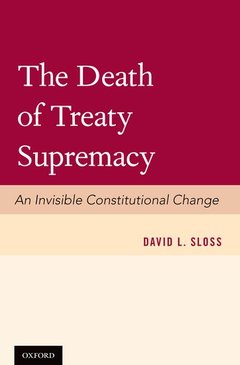The Death of Treaty Supremacy An Invisible Constitutional Change
Langue : Anglais
Auteur : Sloss David L.

This book provides the first detailed history of the Constitution's treaty supremacy rule. It describes a process of invisible constitutional change. The treaty supremacy rule was a bedrock principle of constitutional law for more than 150 years. It provided that treaties are supreme over state law and that courts have a constitutional duty to apply treaties that conflict with state laws. The rule ensured that state governments did not violate U.S. treaty obligations without authorization from the federal political branches. In 1945, the United States ratified the UN Charter, which obligates nations to promote human rights for all without distinction as to race. In 1950, a California court applied the Charters human rights provisions along with the traditional supremacy rule to invalidate a state law that discriminated against Japanese nationals. The implications were shocking: the decision implied that the United States had abrogated Jim Crow laws throughout the South by ratifying the UN Charter. Conservatives reacted by lobbying for a constitutional amendment, known as the Bricker Amendment, to abolish the treaty supremacy rule. The amendment never passed, but Bricker's supporters achieved their goals through de facto constitutional change. Before 1945, the treaty supremacy rule was a mandatory constitutional rule that applied to all treaties. The de facto Bricker Amendment converted the rule into an optional rule that applies only to self-executing treaties. Under the modern rule, state governments are allowed to violate national treaty obligationsincluding international human rights obligationsthat are embodied in non-self-executing treaties.
David L. Sloss is Professor of Law and Director of the Center for Global Law and Policy at Santa Clara University Law School. Professor Sloss focuses his scholarship on the application of international law in domestic courts, with specializations in international human rights law, treaties, U.S. foreign relations law, and constitutional law. He is the editor of The Role of Domestic Courts in Treaty Enforcement: A Comparative Study (2009), and co-editor of International Law in the U.S. Supreme Court: Continuity and Change (2011). He has published numerous articles on the history of U.S. foreign affairs law and the judicial enforcement of treaties in domestic courts. Professor Sloss received his B.A. from Hampshire College, his M.P.P. from the Kennedy School of Government at Harvard, and his J.D. from Stanford Law School. He taught for nine years at Saint Louis University School of Law.
Date de parution : 12-2022
Ouvrage de 480 p.
23.7x15.3 cm
Thèmes de The Death of Treaty Supremacy :
© 2024 LAVOISIER S.A.S.



